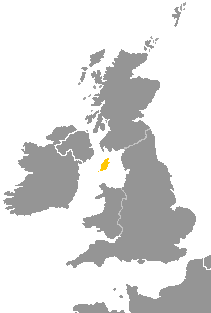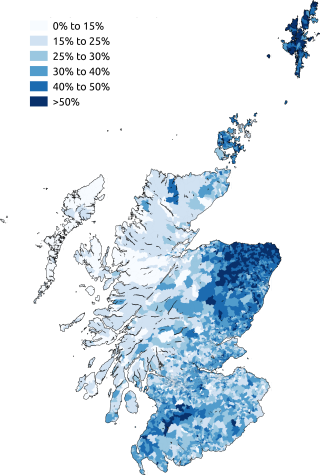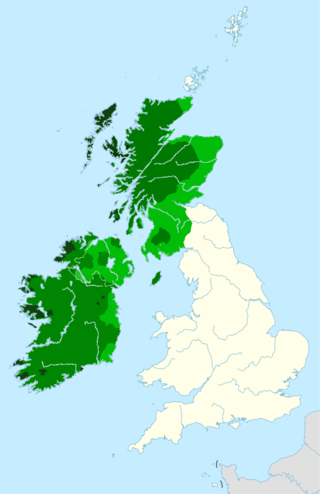
The Celtic languages are a group of related languages descended from Proto-Celtic. They form a branch of the Indo-European language family. The term "Celtic" was first used to describe this language group by Edward Lhuyd in 1707, following Paul-Yves Pezron, who made the explicit link between the Celts described by classical writers and the Welsh and Breton languages.

Manx, also known as Manx Gaelic, is a Gaelic language of the insular Celtic branch of the Celtic language family, itself a branch of the Indo-European language family. Manx is the historical language of the Manx people.

Scottish Gaelic, also known as Scots Gaelic or simply Gaelic, is a Goidelic language native to the Gaels of Scotland. As a Goidelic language, Scottish Gaelic, as well as both Irish and Manx, developed out of Old Irish. It became a distinct spoken language sometime in the 13th century in the Middle Irish period, although a common literary language was shared by the Gaels of both Ireland and Scotland until well into the 17th century. Most of modern Scotland was once Gaelic-speaking, as evidenced especially by Gaelic-language place names.

Scots is an Anglic language variety in the West Germanic language family, spoken in Scotland and parts of Ulster in the north of Ireland. Most commonly spoken in the Scottish Lowlands, Northern Isles, and northern Ulster, it is sometimes called Lowland Scots to distinguish it from Scottish Gaelic, the Goidelic Celtic language that was historically restricted to most of the Scottish Highlands, the Hebrides, and Galloway after the sixteenth century; or Broad Scots to distinguish it from Scottish Standard English. Modern Scots is a sister language of Modern English, as the two diverged independently from the same source: Early Middle English (1100–1300).

The Gaelic Athletic Association is an Irish international amateur sporting and cultural organisation, focused primarily on promoting indigenous Gaelic games and pastimes, which include the traditional Irish sports of hurling, camogie, Gaelic football, Gaelic handball and rounders. The association also promotes Irish music and dance, as well as the Irish language and it also promotes environmental stewardship through its Green Clubs initiative.
Pictish is an extinct Brittonic Celtic language spoken by the Picts, the people of eastern and northern Scotland from Late Antiquity to the Early Middle Ages. Virtually no direct attestations of Pictish remain, short of a limited number of geographical and personal names found on monuments and early medieval records in the area controlled by the kingdoms of the Picts. Such evidence, however, shows the language to be an Insular Celtic language related to the Brittonic language then spoken in most of the rest of Britain.

The Gaelic revival was the late-nineteenth-century national revival of interest in the Irish language and Irish Gaelic culture. Irish had diminished as a spoken tongue, remaining the main daily language only in isolated rural areas, with English having become the dominant language in the majority of Ireland.
Old Irish, also called Old Gaelic, is the oldest form of the Goidelic/Gaelic language for which there are extensive written texts. It was used from c. 600 to c. 900. The main contemporary texts are dated c. 700–850; by 900 the language had already transitioned into early Middle Irish. Some Old Irish texts date from the 10th century, although these are presumably copies of texts written at an earlier time. Old Irish is thus forebear to Modern Irish, Manx and Scottish Gaelic.

Nigel Rees is an English writer and broadcaster, known for devising and hosting the Radio 4 panel game Quote... Unquote (1976–2021) and as the author of more than fifty books, mostly works of reference on language, and humour in language.
Fiona is a feminine given name of Gaelic origin. The name is associated with the Gaelic traditions of Ireland and Scotland, but has also become popular in England. It can be considered either a Latinised form of the Gaelic word fionn, meaning "white", "fair", or an Anglicisation of the Irish name Fíona. The Scottish Gaelic feminine name Fionnghal is sometimes equated with Fiona. In ninth-century Welsh and Breton language 'Fion' referred to the foxglove species and is also a female given name as in Ffion Hague.
A gravity bong, also known as a GB, bucket bong, grav, geeb, gibby, yoin, or ghetto bong, is a method of consuming smokable substances such as cannabis. The term describes both a bucket bong and a waterfall bong, since both use air pressure and water to draw smoke. A lung uses similar equipment but instead of water draws the smoke by removing a compacted plastic bag or similar from the chamber.

The languages of Scotland belong predominantly to the Germanic and Celtic language families. The classification of the Pictish language was once controversial, but it is now generally considered a Celtic language. Today, the main language spoken in Scotland is English, while Scots and Scottish Gaelic are minority languages. The dialect of English spoken in Scotland is referred to as Scottish English.
The International Rules Series is a senior men's international rules football competition between the Australia international rules football team and the Ireland international rules football team.

Lewis Ronald McNeir is an American singer and songwriter.

Irish, known as Gaelic in Ireland, also sometimes known outside Ireland as Irish Gaelic, is a Goidelic language of the Insular Celtic branch of the Celtic language family, which is a part of the Indo-European language family. Irish is indigenous to the island of Ireland and was the population's first language until the 19th century, when English gradually became dominant, particularly in the last decades of the century. Today, Irish is still commonly spoken as a first language in areas of Ireland collectively known as the Gaeltacht, in which only 2% of Ireland's population lived in 2022. It is also spoken by a larger group of second-language speakers, mostly in urban areas.

Ùr-sgeul was an independent publisher of new Scottish Gaelic prose. The name Ùr-sgeul is a Gaelic word which translates variously as: a romance, a novel or a recent tale. Professor Alan Riach, in Scottish Literature: An introduction, summarises the Ùr-Sgeul publishing initiative as "devoted to prose fiction and developing an increasingly impressive list of new titles: short stories and anthologies but mainly single-author novels."

The Gaels are an ethnolinguistic group native to Ireland, Scotland and the Isle of Man. They are associated with the Gaelic languages: a branch of the Celtic languages comprising Irish, Manx and Scottish Gaelic.
Scottish Gaelic literature refers to literary works composed in the Scottish Gaelic language, which is, like Irish and Manx, a member of the Goidelic branch of Celtic languages. Gaelic literature was also composed in Gàidhealtachd communities throughout the global Scottish diaspora where the language has been and is still spoken.

The Scottish people or Scots are an ethnic group and nation native to Scotland. Historically, they emerged in the early Middle Ages from an amalgamation of two Celtic peoples, the Picts and Gaels, who founded the Kingdom of Scotland in the 9th century. In the following two centuries, Celtic-speaking Cumbrians of Strathclyde and Germanic-speaking Angles of Northumbria became part of Scotland. In the High Middle Ages, during the 12th-century Davidian Revolution, small numbers of Norman nobles migrated to the Lowlands. In the 13th century, the Norse-Gaels of the Western Isles became part of Scotland, followed by the Norse of the Northern Isles in the 15th century.
Máirtín Ó Murchú is an Irish professor of Celtic studies and emeritus professor of the Dublin Institute for Advanced Studies. He previously also was Director of the School of Celtic at DIAS and a Professor of Irish at Trinity College Dublin.












